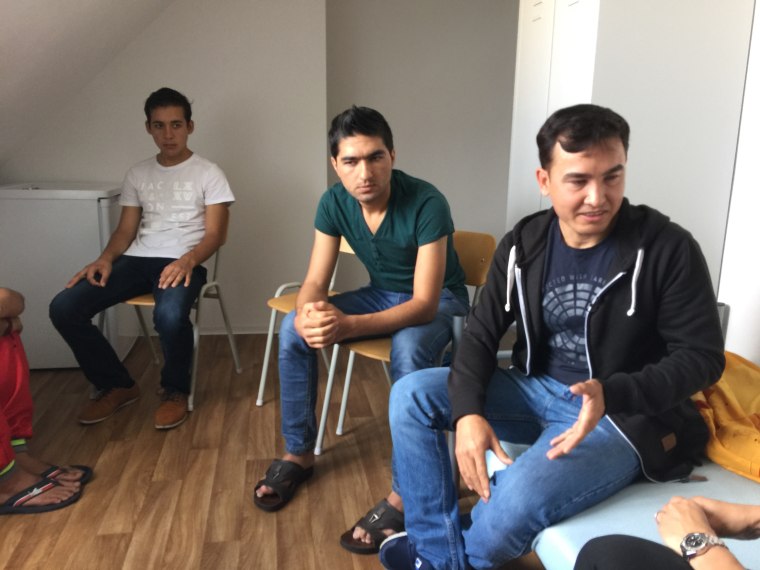MUNICH, Germany — The more than 3,000-mile journey from Afghanistan to the West often starts with a little bit of knowledge gleaned from social media posts — and a big payment to a people-smuggler.
But for many seeking to escape their conflict-ravaged homeland, it has ended with death while attempting to cross the Mediterranean Sea or while locked in the back of trucks.
Spiraling violence and political uncertainty in Afghanistan has sent civilians like Hosseini Amjadali heading to the safety of Europe, which is struggling to respond to the hundreds of thousands of migrants and refugees arriving at its borders.

Amjadali's three-month journey to Germany began with a car trip through Afghanistan to Iran. It was there that people-smugglers hid him in the luggage compartment of a bus which eventually reached the Turkish city of Istanbul.
"They look like us,” he said, referring to the people-smugglers. “They are 25, 26 years old. It is some kind of job for them ... They are waiting for you at the next stop. These people look for you along the way.”
Amjadali said that those who have already reached Europe had pass on the phone numbers of people-smugglers along the route.
“Friends tell us which countries are best to go to after reading on social media which countries are accepting refugees,” he added.
From Turkey, the 27-year-old former translator took a treacherous voyage to Greece by sea. Amjadali said he was crammed on a small plastic boat with five other adults, even though the boat was designed for two adults and two children. He recalled the terrifying experience of large freight ships passing them in the night, before the Greek coast guard came to their rescue.
“We were afraid,” he told NBC News. “But we had no choice.”
Once on the mainland, Amjadali was locked in the back of a truck for a 12-hour journey by road. When the driver opened its door, he and their fellow passengers all ran away. They were at the French border. He later continued on to Germany.
His trek across two continents cost more than $10,000, although he said some migrants paid twice that to reach Europe. Others have walked the entire way. To finance his journey, Amjadali saved money, borrowed money and left everything else behind.
"If you don't pay, they kill you," Amjadali said of the smugglers.
While waiting for his asylum claim to be ruled on, he lives in a Munich apartment with five other Afghan asylum seekers with strikingly similar stories of being smuggled through countries including Turkey, Greece, Italy and Hungary. They each get 325 euros ($363) a month as well as free lodging and German language classes while their claims are being processed.
"We are free here now," Amjadali said.
Mohammed Reza Mohebi, 28, from Kundus, Afghanistan, lives downstairs with his wife and children aged 9, 8 and 3. Mohebi says he paid $10,000 per person to travel a similar route.
On the overcrowded boat ride from Turkey to Greece, Mohebi said his 8-year-old daughter fell overboard, but he managed to pull her back just in time. On the last leg to Germany, his family was transported with about 25 other people in a refrigerated truck, in which they could hardly breathe.
“Especially for children, it is a very difficult journey," Mohebi said. “I feel safe here now.”
His family now gets 1,269 euros ($1,419) per month in benefits.
Like Amjadali, the Mohebi family are among the lucky ones. The UNHCR reports that nearly 3,000 migrants have died trying to reach Europe by sea since the start of 2015.
Last week, the body of a drowned two-year old boy washed up on a beach in Turkey.
Only days earlier, the decomposing bodies of 71 migrants and refugees were found in an abandoned truck in Austria.
The UN refugee agency estimates show nearly 80,000 Afghans applied for asylum in Europe in the first half of 2015, almost three times the figure for the same period a year earlier.
Asylum seekers from Afghanistan are second only to those from Syria, according to agency data.

